HotReview.org Editor's
Picks
Shows Worth Seeing:
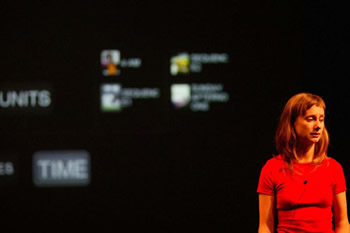
Point Blank
By Edit Kaldor
P.S. 122
150 1st Ave.
Box office: (212) 352-3101
This small, quiet, unassuming
show by Budapest-born, American-educated Edit Kaldor packs an
oddly powerful punch. A petite, short blonde, Kaldor presents
herself as a nondescript, 19-year-old Finnish girl named Nada
who is unsure what to do with her life and goes tramping around
Europe taking pictures of strangers with a powerful zoom lens.
She assembles some 70,000 photos, many quite invasive, and has
been obsessively categorizing them in the hope that the organization
process might help her make some decisions about her future. As
she speaks, conducting a sort of quasi-public slide show aided
by a friend at a laptop, selected photos are projected onto two
large screens behind her, along with the elaborate organizational
folder-trees from her computer’s photo storage. Slowly we
realize that, her air of ordinariness notwithstanding, this girl
is consumed by her categorizing process. It has become a substitute
for actual experience. Traveling may teach some people greater
worldliness, but with Nada it seems to have exacerbated a profound
psychic isolation bordering on autism. She has no apparent ability
to feel passionate desire beyond the dry questions of categorization
in her folders, and she expresses no emotional connections with
actual people, only with the appearance of people in her candid
and interesting yet ultimately pseudo-intimate snapshots. The
resonance of all this for the rest of us in our screen- and image-obsessed
era is deep and troubling. Kaldor's anti-spectacle is also especially
forceful due to the crafty understatement of her modest affect.
This is a shrewd and perceptive artist from whom we are sure to
hear more in years to come.
-----------------------------------
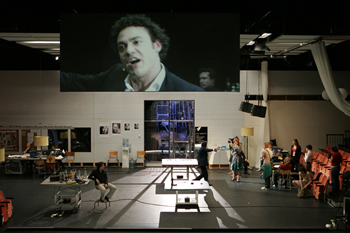
Opening Night
By John Cassavetes
Adapted and directed by Ivo van Hove
BAM Harvey Theater
651 Fulten St., Brooklyn
Box office: (718) 636-4100
Ivo Van Hove’s Opening
Night is a rare theatrical quantity: a stage adaptation of
a celebrated film that is far and away better than the film. John
Cassavetes wrote and directed Opening Night in 1977 as
a rueful meditation on ageing: a vain and famous actress (played
by Gena Rowlands, Cassavetes’s wife) deliberately ruins
the last previews of a Broadway-bound play with drunken antics
and tantrums, then seems to suffer a mental breakdown triggered
by the accidental death of a girl seeking her autograph. It was
Cassavetes’s most personal film, and to see it today is
to recognize how unnecessarily blurred and hobbled it was by tedious
indulgences: long slogs through trite alcoholic stupors, important
story points muddied by the fixation on monotonous, brooding closeups.
At 146 minutes, the film feels an hour too long.
Van Hove says he is a Cassavetes fan. He
recognizes the filmmakers’ self-critical “adult”
atmosphere as akin to the complex, self-conscious aura he always
works to generate onstage. Importantly, though, he never saw this
particular film. He worked only from Cassavetes’s screenplay
in developing this adaptation with Toneelgroep Amsterdam, and
that’s no doubt why its story is so clear and engaging.
One sees for the first time how strong the subplots were involving
the actress’ first husband, the director and his wife, and
the dead girl, for they now shine through as penetrating and necessary
rather than as histrionic excrescences. The dead girl, always
a quintessentially theatrical touch, is now a much more forceful
and disturbing presence. The alcoholism is treated with a sense
of measure, one of a number of physical excesses that the play
shows up as conceits. And most crucially, the story’s multiple
locations are folded into a terrifically flexible unit set outfitted
as a rehearsal stage. Actors change costume there, actual spectators
are seated to one side, and camera operators shoot live video
of the action that is projected into large screens above, allowing
us to see almost everything in closeup and panorama all at once.
Thus technology handles the essential metadramatics of the tale,
its all-important self-consciousness about the theater, so the
actors are left free to enact the painful story, pushing it unforgettably
toward its bittersweet, beautifully indeterminate closure with
the prima donna reluctantly regaining reason. This is unquestionably
the high point of the BAM season so far: at the same length as
the film, it earns every minute and more.
-----------------------------
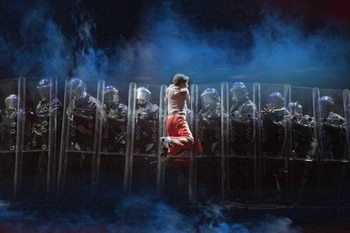
Billy Elliot: the Musical
Directed by Stephen Daldry, Book and lyrics by Lee Hall, Music
by Elton John
Imperial Theatre
249 W. 45th St.
Box office: (212) 239-6200
Curiously enough, this eagerly
awaited musical adaptation of the movie Billy Elliot
is almost as good as its hype. The story about a boy from a gritty
northern English coal-mining town who discovers a passion for
ballet was always irresistibly charming—just the sort of
triumph-against-the-odds, home-town-boy fairytale Hollywood got
rich on. The British adaptors of this show have been unusually
clever, though, in giving the tale strong theatrical legs. Elton
John’s rousing anthems and ballads pull all the right heartstrings
to make the audience cheer for both the boy’s success and
the victory of the union in the 1980s miners’ strike that
forms the play’s social background. But since that strike
ultimately failed—the Thatcher government famously broke
the union—the play’s impassioned cries of “solidarity”
have decidedly funereal overtones, and the story of the boy’s
individual triumph has particular poignancy against the bitter
failure of his loved ones’ collective action. This incongruity
gives the work a modest political complexity that other Cinderella
stories lack. The show is also wonderfully inventive. Director
Stephen Daldry (who also directed the movie) has inserted bizarrely
fluid choruses of cops and miners, for instance, who spread their
good and bad energy willy-nilly while sweeping through windows,
gyms and kitchens. At one point, Billy dances a strangely anomalous
pas de deux with his imagined older self, who seems to
provide the only viable adult role model he can muster. There
are half a dozen inspired creations of this kind, as well as superb
performances by (among others): Haydn Gwynne, who finds just the
right mixture of stoniness and congealed syrup for Billy’s
dance teacher; Carole Shelley as his wacked out grandmother; and
the three child-actors who play Billy (I saw Kiril Kulish). It
feels decidedly odd to endorse a blockbuster London import in
this way, but, well, this show deserves to be seen.
----------------------------
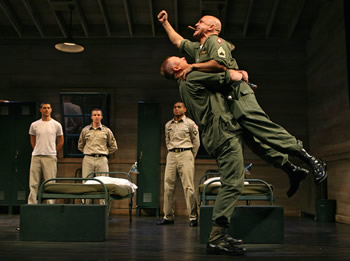
Streamers
By David Rabe
Laura Pels Theatre
111 W. 46th St.
Box office: (212) 719-1300
What a happy surprise this
Roundabout revival of Streamers is. I vaguely remember
liking David Rabe’s play when it first appeared more than
three decades ago, but I haven’t seen or read it since and
who trusts memories that old? Turns out, it does tell a crackling
good story, as I remembered. More than that, though, I now see
that it’s one of those rare American plays that transcends
its strict realism due to the author’s sheer power of concentration,
his ability to follow through unflinchingly while tracing out
the consequences of his shrewdly drawn, volatile given circumstances.
Rabe never blinks in depicting this awful collision between soldiers
of different classes, races and sexual orientations, who are thrown
together in a Virginia army barracks while awaiting probable orders
to Vietnam. The outlines of the play’s scenario, thus described,
may easily sound like a yawn, since countless plays and movies
have exploited it for tendentious or sentimental ends. No easy
bromides or message-billboards for Rabe, though. His people are
dauntingly complex and multi-colored, and their terrible showdown
has broad allegorical resonance, even an air of tragic inevitability.
Scott Ellis’s production is smart, swift and unexpectedly
potent given that he keeps it rather cool until the climactic
violence. The actors are clear and penetrating, though some are
definitely stronger than others: J.D. Williams is dead-on as diplomatic
Roger, as is Ato Essandoh as menacing Carlyle, but Brad Fleischer
never quite finds the blustery uncertainty that sets Billy up
as a sacrificial goat. In any case, the strength of the ensemble
makes up for spotty deficiencies, and the people seated around
me were visibly shaken by the ending.
---------------------------
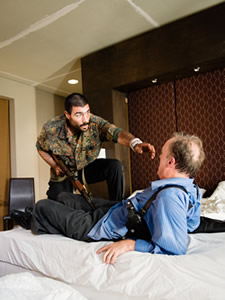
Blasted
By Sarah Kane
Soho Rep
46 Walker St.
Box office: (212) 352-3101
Sarah Kane’s suicide
in 1999 was a great loss to the contemporary theater, but until
recently it has been very difficult for New York theatergoers
to understand why. The willfully unconventional plays Crave
and 4:48 Psychosis have been seen here in dreadfully
static and morose productions that have left an impression of
Kane as basically a documentarian of depression, a psychological
basket case with a flair for oratorio. Now there is finally more
to talk about, because of the long belated New York premiere of
Blasted, the play that made Kane notorious in Britain.
Written in 1995, Blasted is, on one level, an over-the-top
indulgence in repellent violence. With its mélange of rape,
torture, disease, terrorism, cannibalism and more, it outdoes
even the most brutal dramas of the “in-yer-face” genre
to which it belongs. The difference is that Kane also has deeper
political ambitions in this work, and they shine through in both
the public and private action, reverberating unforgettably from
the war raging outside the hotel room where the play is set to
the horrifying personal negotiations inside. Sarah Benson’s
lucid and superbly cast production isn’t for the faint-hearted,
but it should be seen by anyone interested in clawing for some
no-bullshit, redemptive air in the tunnel of ageless human violence.
Historically, it is also fascinating, and saddening, to recognize
that the violent legacy of Edward Bond and Howard Brenton actually
bore nourishing dramatic fruit for a brief moment in the 1990s.
Side note: the ingenious, spot-on set design by Louisa Thompson,
which must self-destruct halfway through the action, is alone
enough reason to see this show.
--------------------------------
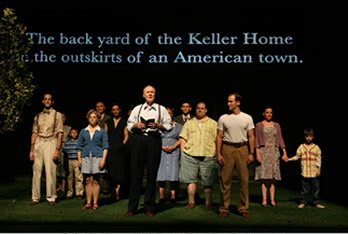
All My Sons
By Arthur Miller
Gerald Schoenfeld Theatre
236 W. 45th St.
Box office: 212-439-6200
For obscure reasons, we seem
to need the British to show us how to breathe life into America’s
most heroic dramatist from the last century. This time it’s
the director Simon McBurney who has taken an Arthur Miller play
more than 60 years old and made it seem as fresh as a new Tony
Kushner work. I’ve seen All My Sons several times
before, and it has always seemed to me a rather straightforward
nugget of 1930s leftist moralism: the protagonist, Joe Keller,
is a heel because he knowingly sold defective airplane parts to
the Army Air Force during wartime and blamed his partner for the
crime, all (he says) so he could leave his sons a successful business—an
extremely moving but also rather tidy and obvious fable demonstrating
the necessity to look beyond callous capitalist imperatives to
our larger social responsibilities. Refreshingly, McBurney’s
production reveals a more complex tale where motives are deeper
and more contradictory than the characters’ self-justifying
bluster implies. Patrick Wilson’s Chris, for instance, the
dutiful war-veteran son whose uncompromising idealism drives Joe
to suicide in the end, comes across here not as a hapless naïf
but rather as another type of killer, ruthless in moral rigidity
where Joe was ruthless in profit-seeking. Diane Wiest as Joe’s
wife Kate and Katie Holmes as Ann, the girl Chris wants to marry,
are just as multifarious in their nuances. The production is also
a visual feast, with sumptuous animated projections against a
clapboard back wall and a Midwestern yard sketched with just the
right iconic objects (design by Tom Pye). In an interview in the
1990s, Miller said that All My Sons was being produced
more than many of his other plays, and he guessed it was because
of the high number of public investigations going on into official
malfeasance in business and government. Had he lived a little
longer, he would have understood another reason: the arrival of
apparently endless war, which has made the genre of returning-soldier
drama heart-breakingly apt. All My Sons is more than
a returning-soldier drama, but that aspect of it is hard to forget
as the climax arrives and drives home the pointed question of
how basic our civilized values are, and what it really means for
a nation to say, reflexively and habitually, that we must win
at all costs.
